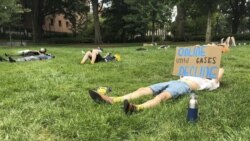This week, the University of North Carolina at Chapel Hill canceled in-person classes. It was just one week into the start of the new school year.
The university said it will move to online learning and assist students who want to leave campus housing. The decision came after officials reported 130 coronavirus infections among students living on campus. Five university employees were also infected.
Before the decision was announced, the student newspaper wrote an opinion article called, “We all saw this coming.” The paper noted that parties held by students during the first week of school were no surprise. It added that school officials should have decided to start the year with online-only classes.
No parties, no trips, no guests
Other American universities welcoming students back to campus this autumn are requiring promises from students to help contain the coronavirus. Those promises include: no wild parties, no long road trips and no outside visitors on campus.
At the University of Notre Dame in South Bend, Indiana, school officials have reported 58 confirmed coronavirus cases since students returned in early August. The officials said at least two off-campus parties over a week ago were identified as sources for new infections.
Paul J. Browne is vice president for public affairs at Notre Dame. He said the university is prepared to suspend or take other disciplinary action against the hosts of such parties.
Critics question whether it is realistic to demand that college students not act like college students. But the push for restrictions shows the high risks for universities planning to bring at least some students back. Widespread COVID-19 testing, quarantines and plastic barriers in classrooms will not work if too many students do not obey the rules.
Sanjali De Silva will enter her final year at Tulane University in New Orleans. She told the Associated Press she thinks most students will be “really respectful” of the restrictions. But, she said, she fears there will be some students who decide not to.
Tulane students have already gotten a strong warning from school officials. After a summer weekend of large gatherings, university official Erica Woodley wrote to students to warn them not to meet in large groups.
"Do not host parties or gatherings with more than 15 people, including the host,” the message said. If such gatherings are held, students could face temporary or permanent removal from school.
Woodley ended the message by asking students if they “really want to be the reason” Tulane and New Orleans close down again.
Scott Galloway is a professor of marketing at New York University. He told the AP that most college students are “civic-minded, responsible people.” They are also young people, he said. So he thinks some will have difficulty ignoring their strong desire to socialize and find mates.
Galloway said he plans to teach online this fall and return to campus when there is a coronavirus vaccine.
High cases of infections involving fraternities have been reported at other schools. They include the University of Southern California, the University of Washington and the University of Mississippi.
The University of California at Berkeley recently decided to start the autumn term with online classes after fraternity parties caused a local rise in cases. Carol Christ, who leads the school, told an online event that after weeks of careful planning, officials decided against in-person teaching.
The student promise agreements follow the advice public health officials have been giving since March for college settings. Yale University’s agreement includes a promise to stay in Connecticut during the autumn term through November 21. It also includes one not to "invite or host” non-Yale visitors on campus without permission. Ohio State University's agreement includes a promise to complete daily health checks.
Students at New York’s Cornell University must promise not to organize, host or attend events that may cause "safety risks." University of Pennsylvania students are warned in the school's agreement that alcohol and drugs are no excuse for risky COVID-19-related behavior. The agreement at New York’s Syracuse University requires students to promise to get an influenza vaccine and avoid social gatherings of more than 25 people.
At the University of Pennsylvania, Ben Zhao is hopeful that the new rules will be followed. He is entering his final year this fall.
Zhao, who is from the town of Northbrook, near Chicago, Illinois, says he is happy to be returning to campus after a shortened spring semester. He misses his friends, studying with students, and the school newspaper, where he is the lead editor.
"They're all big things that I don't want to necessarily miss out on” for my final year, Zhao said.
I’m Alice Bryant.
This report combines two stories from the Associated Press. Alice Bryant and Hai Do adapted them for Learning English. Bryan Lynn was the editor.
________________________________________________________________
Words in This Story
campus – n. the area and buildings around a university, college or school
host – v. to be the person who is entertaining guests socially or as a job
discipline – n. orderly or prescribed conduct or pattern of behavior
quarantine – n. the situation of being kept away from others to prevent a disease from spreading
fraternity – n. an organization of male students at a U.S. college
influenza – n. a common illness that is caused by a virus and that causes fever, weakness, severe aches and pains, and breathing problems
editor – n. a person whose job is to prepare something written to be published or used






